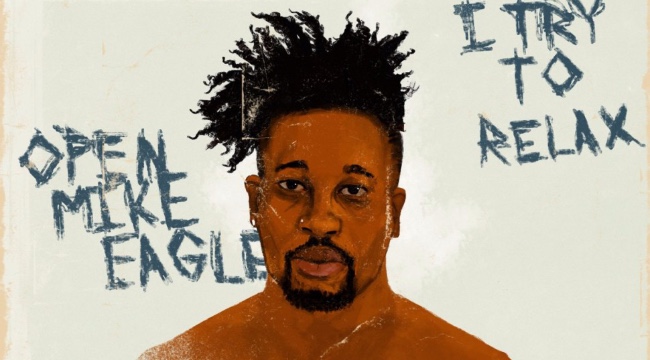
“How is it ‘both sides,’ we ain’t both dyin’?” Open Mike Eagle queries on his latest project, the six-song EP What Happens When I Try To Relax. The question is as compelling as the album on which it resides, the result of Mike’s tangles with the anxieties of indie-rap success and American politics in the wake of last year’s excellent, profile-raising full-length, Brick Body Kids Still Daydream.
While Open Mike has been a fixture of the underground rap scene for some time, the highly conceptual approach to his last album and the resulting media attention didn’t only increase his celebrity among fans of alternative rap, it also did the same for the already considerable pressures Mike faces at all times as an independent artist and a Black man in America.
Yet, even with his profile rising by the day, he still faces the everyday challenges of simply surviving in a time when it seems as though the law enforcement has been emboldened in its continual abuse of authority and deteriorated relationship with Black folks. “I live in the hood and my city gets difficult,” he grumbles on “Relatable.” Why? “‘Cause they treat us like criminals,” he reminds the listener, playing on the irony of the song’s title. He’s not really “relatable” at all to some of his audience, although some of other more mundane concerns may be the same, like figuring out “which sequels are truly canonical.”
His frustrations stem, it seems, largely from the fact that he’s billed as the ultimate regular-guy rapper, even more so than a Drake or a Kanye, but that there’s a disconnect between himself and the audience that seems most drawn to his music. Aside from eschewing the trappings of bling and aggressive, tough-guy demeanor, his humor and wry outlook have attracted listeners who don’t actually get what his life is really like, both as a working musician who pays bills and plays small clubs and as someone who has been consistently faced with the darker side of America’s seemingly endless opportunities.
For one thing, his audience consists of mostly hipster white fans, too cool to absorb mainstream rap, despite the personal nature of his music, which is geared toward his unique experience on the opposite end of the cultural spectrum. He points out his frustration with this cognitive dissonance on “Southside Eagle (93 Bulls),” rhyming, “Hey Brain, what we doing for the night? / Trying to reach Black kids in a room full of whites.” The fact that much of his notoriety comes from publications that serve this specific audience is an especially touchy subject for him: “Got in beef with a website ’cause they don’t get that my life’s real every night,” he muses.
And though he’s built a solid following despite these frustrations, he still feels out-of-step with rappers who might have ordinarily been peers, were all things equal. “I’m in a rap network, out of placement,” he says. “I saw Kendrick at Leimert didn’t say sh*t / I saw Vince at the club and didn’t say sh*t / ‘Cause this independent hustle is adjacent.” The irony is, though he’s from Chicago originally, he’s been in LA grinding at least as long as some of the more famous names from LA, at many of the same venues, yet, doesn’t have the same notoriety or even feel like doing the networking required to achieve it. Even more ironically, he’s not really talking about anything all that different from their subject matter; they’re all being harassed by police and downtrodden by policies that work to the detriment of his home and people who look like him.
Of course, he escapes through weird comedy and video games — on “Microfiche” he details late-night sessions of Castlevania while referencing his own jokey single “Dating Ghosts” on its follow-up, “Single Ghosts” — but there’s no escaping the feeling “Your generation’s been cursed, what that trauma do,” as he puts it on album closer “Maybe Gang (An Initiation).” In the end, despite all he’s accomplished, he still feels like an outsider, but despite feeling like an outsider, he’ll always be lumped in with America’s warped preconceptions of Black folks. What happens when Open Mike Eagle tries to relax? He doesn’t get to; that’s just the way it is for those of us at the bottom of the social hierarchy. We can’t escape our anxieties, we can only hope to wrestle with them as eloquently as Mike does here.






